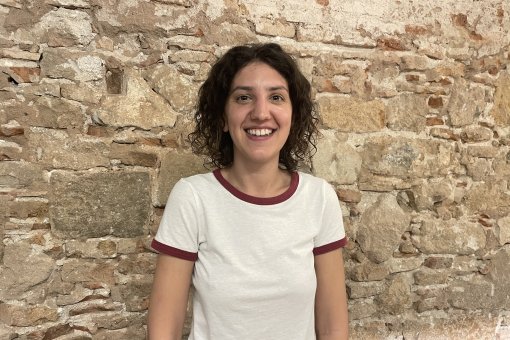Images
Participants

Contact

2020 got off to a flying start for Jessica Vitos with the publication of a paper in PNAS addressing how cancer cells exploit the p38 protein to further their growth and division. Jessica, who did her PhD under the supervision of Ángel Nebreda, defended her thesis back in January 2018 and a year later moved away from the bench to join Ysios, a venture capital company.
Like many PhD students, towards the end of her training Jessica’s thoughts turned to the future. IRB Barcelona played a decisive role in defining her career path. “PhD students here learn cutting-edge science, have access to a great network, and can enrol on many complementary training workshops. One of the courses I attended in my last year was ‘From Science to Business’, which was organised by the ESADE Business School together with the BIST. I gained true insight into promoting entrepreneurship in the innovation sector,” she explains.
After completing her PhD, Jessica remained in Nebreda’s lab as a postdoc preparing the p38 paper for publication and thinking her future through. She then took the decision to move into ‘venture capital’. So what exactly is that? “We are investors,” she explains. “At Ysios, we specialise in the life sciences sector. We support, advise and accompany biotechs as they develop their drugs, perform experiments and do clinical trials to turn their ideas into actual therapies.” Since it was founded in 2008, Ysios has invested in 25 companies in 8 countries, leading to approval of 8 products by regulatory agencies. These include medical breakthroughs such as the first oncolytic virus ever approved for the treatment of cancer and the first off-the-shelf stem cell therapy for patients with autoimmune disease.
Jessica is clearly enjoying her work at Ysios. “It’s very interesting. I have learned about the latest trends in biotech and drug development and met tons of new people. I analyse the science and development plans of biotech companies. I delve into the scientific literature, talk to experts, brainstorm with the team and have discussions with companies. Then the team debriefs internally to choose the most promising ventures in which to invest,” she says.
IRB Barcelona channels considerable efforts into informing its student community about career options beyond the bench. Alba Olivares, from IRB Barcelona’s Innovation Department, says, “That the “From Science to Business” course helps researchers to understand how promising research results can get closer to the market and provides them with the skills required to promote their careers in applied life science and a first experience in a business environment”.
Along these same lines, IRB Barcelona coordinates the EU’s Horizon 2020 project “European Academy for Biomedical Science” (ENABLE), a series of yearly symposia organised by and for PhD students. These gatherings offer presentations by leading speakers and a variety of other activities, including a careers day that showcases employment opportunities in various fields, including scientific editing, public communication, entrepreneurship, the pharma sector, and investment analysis, among others.
Venture capital is one of many sectors beyond the bench that PhDs in the life sciences can enter. However, career moves are a daunting prospect for many. Jessica offers some advice “Find some time to think about ‘what do I like most about my current work?’ Is it pipetting, revising papers, doing outreach activities or maybe teaching summer undergrads? When you have the answers, talk to people working in those sectors and inform yourself about their experiences, how your PhD adds value for doing that job, and the requisites needed to enter that sector. This will make decisions easier to make”.
The quality and breadth of doctoral training at IRB Barcelona places its young researcher community in an excellent position in the labour market. Indeed, a quick look at the fields in which our alumni are working reflects the diversity of career paths available. Here’s a taste of some beyond academia: innovation management, clinical operations, investment analysis, software engineering, regulatory affairs, perfume industry, knowledge and quality management, consultancy, and business development, and even chemistry applied to haute cuisine.
The sky is the limit! Go for it!
About IRB Barcelona
The Institute for Research in Biomedicine (IRB Barcelona) pursues a society free of disease. To this end, it conducts multidisciplinary research of excellence to cure cancer and other diseases linked to ageing. It establishes technology transfer agreements with the pharmaceutical industry and major hospitals to bring research results closer to society, and organises a range of science outreach activities to engage the public in an open dialogue. IRB Barcelona is an international centre that hosts 400 researchers and more than 30 nationalities. Recognised as a Severo Ochoa Centre of Excellence since 2011, IRB Barcelona is a CERCA centre and member of the Barcelona Institute of Science and Technology (BIST).




